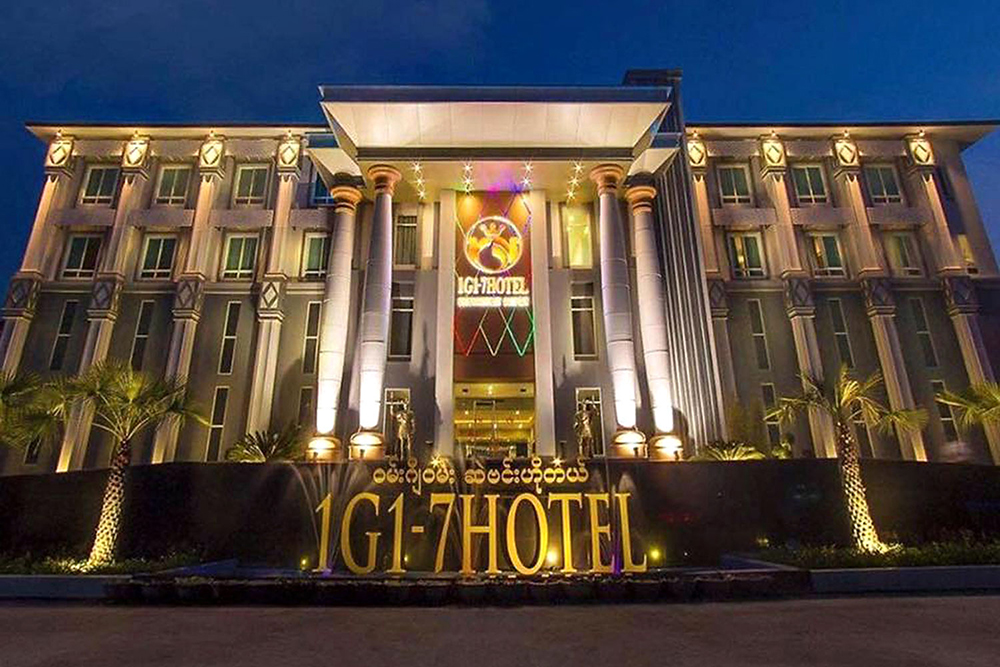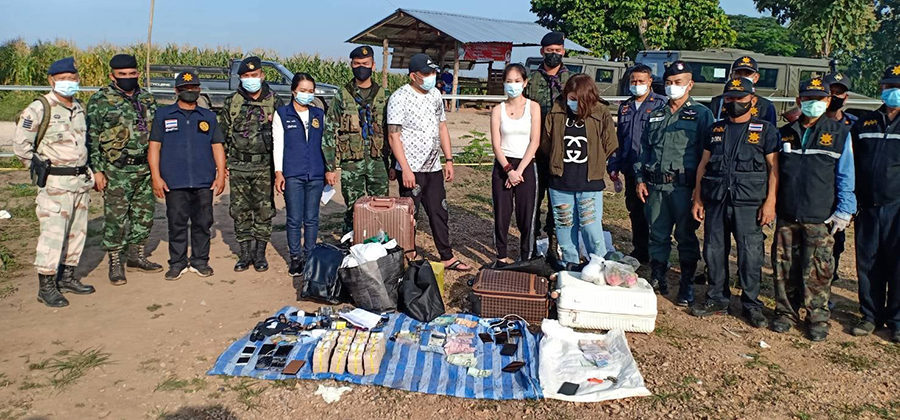As Myanmar’s COVID-19 cases spiked in July and August, Thai newspapers assured their readers that government agencies were collaborating to step up patrols along the border to prevent illegal crossings. Photographs taken at the time showed well-equipped, heavily armed soldiers and police patrolling the Moei River, which forms the border between Thailand’s Mae Sot and Karen State’s Myawaddy.
Further north, in Mae Sai across from Shan State’s Tachileik, visitors could see police and soldiers—who were joined by undercover officers—conducting surveillance of the Myanmar border. The headlines and the sight of soldiers patrolling the border no doubt reassured Thais that they were safe.
But this sense of security was misplaced. Though officials monitor checkpoints and conduct checks, people still manage to cross the frontier in both directions. In recent months, security officials on both sides, as well as human traffickers and insurgents on the Myanmar side, have made a fortune smuggling Thais, Myanmar people and goods across the border.
Since the deadly virus arrived in Southeast Asia from China, Thailand has been praised for implementing one of the world’s most successful coronavirus containment strategies. However, alarm bells have sounded recently, with the discovery of a number of COVID-19 cases in Thailand linked to migrant workers from both countries who slip back and forth undetected.
Thai and Myanmar workers illegally cross the porous border and some have found lucrative jobs and business opportunities during the lockdown.

Flouting Myanmar’s COVID-19 restrictions, numerous entertainment complexes and bars are still open in Tachileik, as well as in Myawaddy opposite Mae Sot. Young Thai women are in high demand among guests at hotels in these towns. Thai newspapers and TV news outlets have reported that some young Thai women earn 100,000 baht per month.
In Mae Sai, Thailand’s northernmost border town, three more Thai returnees from entertainment venues in Tachileik were confirmed to be infected with the coronavirus on Thursday, raising the total number of COVID-19 cases in Chiang Rai province to 49.
Many young Thai women illegally enter Myanmar to work in entertainment complexes and bars in Tachileik. One hotel and entertainment complex there, the 1G1-7 Hotel, has been identified as a COVID-19 hotspot, with more than 10 Thai women and tourists testing positive for COVID-19 upon returning home from the venue.
The 1G1-7 Hotel, which has been closed down and whose manager now faces legal action, counted Thai, Chinese and Myanmar guests among its frequent visitors. Residents and local reporters in Tachileik revealed that the four-story building had 20 VIP karaoke lounges, a massage parlor and online gambling facilities.
A popular nightspot, the hotel is jointly owned by businesspeople from Thailand, Myanmar and China, with a Chinese investor reportedly holding the largest stake.
In Myawaddy, the Myanmar government has imposed a “strict” lockdown, but several casinos in the border town remain open, and gamblers continue to flock in through illegal routes. As many as 2,000 Chinese punters are said to reside in Myawaddy Township’s new gambling hub, Shwe Kokko. When Myanmar’s COVID-19 situation worsened a few months ago, many Chinese sneaked into Thailand. Some evaded border forces while others paid handsome sums to the Myanmar, Thai and Karen insurgents who control parts of the border. Some Chinese even wear Myanmar or Karen outfits as they sneak into Thailand.

In the early days of the COVID lockdown, a number of Thai and Chinese investors, gamblers and criminals involved in the Shwe Kokko gambling project are known to have crossed the border through checkpoints controlled by Karen insurgents and the ethnic Karen Border Guard Force, and have no problem traveling back and forth between Bangkok and Myawaddy.
Others haven’t been so lucky, however.
In October, Thai police arrested three Chinese who crossed the border illegally after leaving Shwe Kokko. At the time of their arrests, the trio had 8 million Thai baht (over US$255,000 or 328 million kyats) on them.
Indeed, in the Mae Sot-Myawaddy border area alone, hundreds of people at least cross the border illegally every day undetected. Many pay “guardians”—Thai and Myanmar security officials, smugglers belonging to established networks, or ethnic rebels—to be “escorted” across.
Myanmar migrant workers return home via official checkpoints, but some head back to Thailand illegally. Human traffickers charge 8,000 baht to transport one person from Mae Sai to Chiang Mai.
Thai sources believe the three Chinese arrested in October were fleeing Shwe Kokko after the issue of the presence of Chinese illegals in the town was raised at a press briefing in Naypyitaw. So far, however, Myanmar’s government and military have done little to inspect or patrol inside Shwe Kokko.
The COVID-19 situation doesn’t seem to have disrupted arms smugglers’ operations, though it may have raised their expenses.
In late June, Thai officials intercepted a shipment of weapons in Mae Sot. They seized a large cache of brand-new Chinese-made war weapons and detained two Thai citizens. The weapons seized included M16, M5.56 and AK-47 assault rifles, as well as M79 grenade launchers.
An investigation by The Irrawaddy revealed that the seized weapons belonged to the Democratic Karen Benevolent Army (DKBA) and were ultimately destined for Rakhine State bordering Bangladesh, where terrorists and rebel forces have hideouts and camps. Karen insurgents based along the Thai border still order arms and ammunition from the Thai market or from China.

Last month, Thai authorities seized a box containing 16 million Indian rupees (286.22 million kyats) found in the luggage compartment of a bus departing from Mae Sot district, heading to northern Thailand. Thai authorities are still investigating, but have traced the money to Myawaddy. The few reports of the incident in the Thai papers suggest the Northern Branch Narcotics Control Board suspect the money is linked to illegal cross-border trade or some other dark activity in the Golden Triangle area. Rebel sources in Karen State speculated the cash seizure is a sign that weapons and ammunition have been ordered. Some diplomats in Bangkok fear the order was placed by terrorists operating along Myanmar’s borders with India and Bangladesh.
For the most part, illicit activity along the border continues to flourish despite COVID-19 and its related restrictions.
Rebels and militia in Myanmar involved in producing crystal methamphetamine still have the means to sell and ship large amounts of crystal meth to Thailand. In July, Thailand’s Office of the Narcotics Control Board (ONCB) reported that mountains of “ice” had already been seized in the country this year. Thai officials said that during periods when COVID-19 restrictions are eased, traders resume the distribution of the drug, and the illicit trade continues to flourish.
The trade in drugs, guns, gambling, sex and entertainment continues to thrive along the Myanmar-Thailand border, despite the bold headlines and photos of heavily armed, patrolling security forces on the front pages of Thai and Myanmar newspapers.
You may also like these stories:
Assessing Thailand’s Geostrategic Value to the Biden Administration
China’s Growing Influence in Myanmar Ethnic States Raises Alarm
Japan’s Stepped-Up Negotiating Role a Welcome Development in Myanmar

















